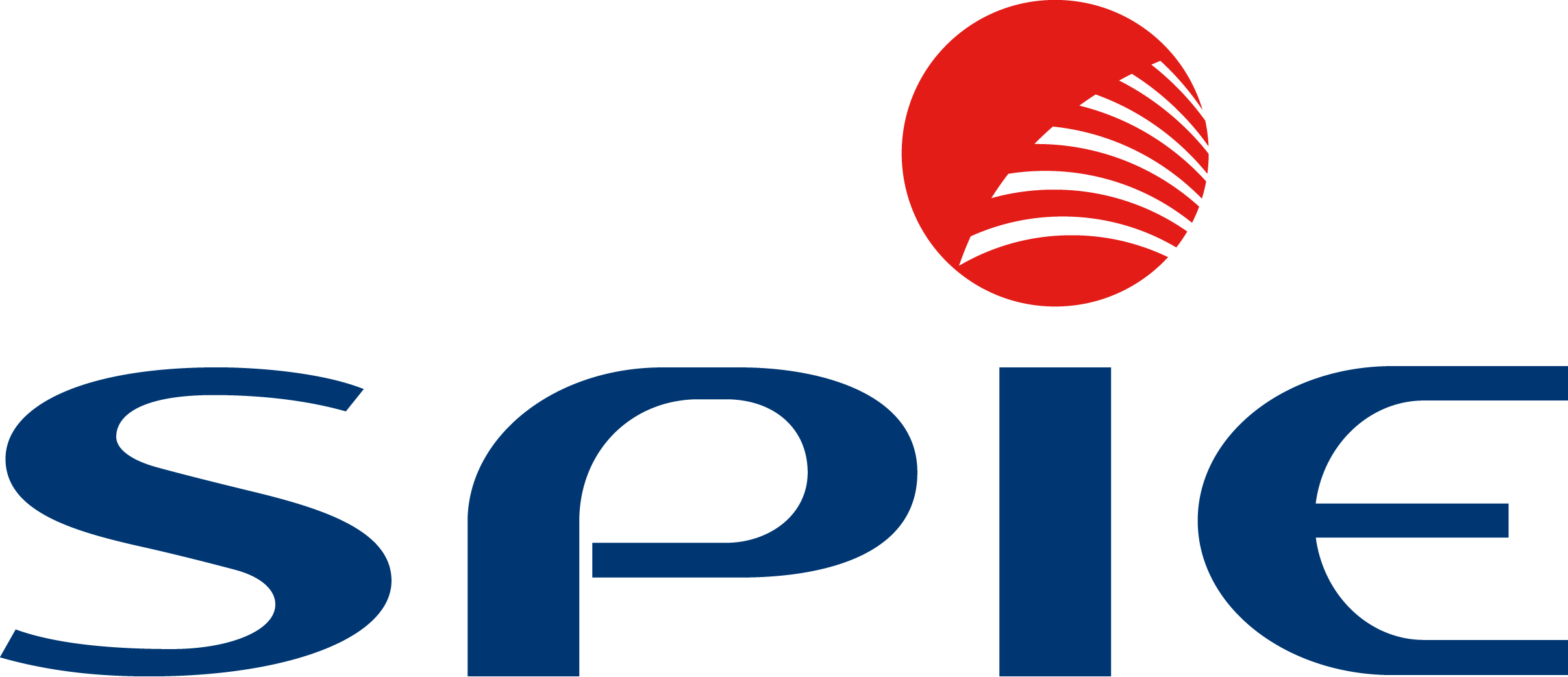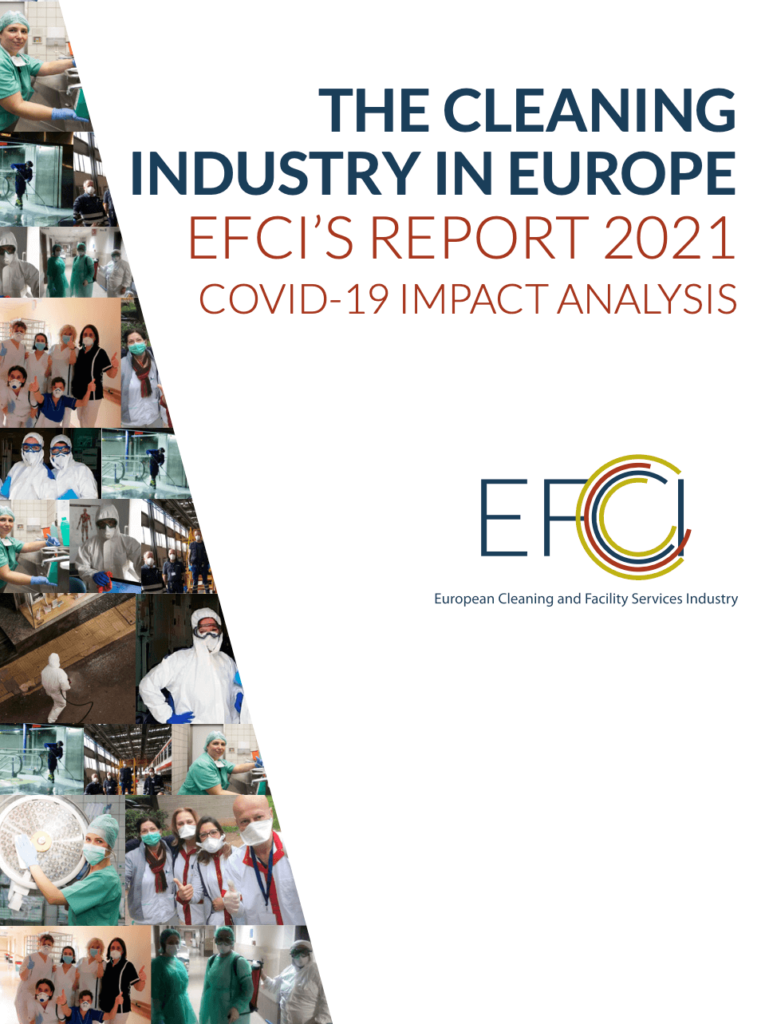The European Cleaning and Facility Services Industry (EFCI) is composed of 15 associations seeking to represent the industry nationally.
EFCI recently hosted its annual Cleaning and Facility Services for Europe’s Recovery event (11 – 15 October 2021). This online event included industry seminars and discussions that explored the challenges the European cleaning industry has faced and expects to face in the coming years. EFCI is taking an active role in Europe’s recovery from recent health and economic hardships, as well as addressing pressing issues like greener cleaning alternatives and innovation.
During this event, EFCI unveiled its 2021 report.

Key Takeaways
- The EFCI Industry Report 2021 outlines the impact of Covid-19 on the cleaning industry across Europe.
- Most companies saw a decrease in turnover and employees, but some interesting outliers tell a more complex and fascinating story.
- Companies that performed best during trying times embraced new technologies, expanded service options, and leveraged innovation to overcome challenges.
What Is the EFCI Report?
Each EFCI report compiles industry research and insights, cleaning companies and other stakeholders can use to understand trends and how others respond to industry challenges. As you might expect, the 2021 report primarily centers on the impact of Covid-19 on cleaning companies.
A few moments in history stand out as change catalysts. Covid-19 is one such event that will change how facilities do things for the foreseeable future.
The report admits that it’s still difficult to take holistic views of the pandemic because we’re still in it, but the information seeks to shed light on what’s happening at the European level. They recognize that identifying trends now could impact legislation. It can support facilities and cleaning companies trying to navigate the pandemic. They acknowledge incredible agility within a cleaning industry that has already adapted significantly but recognize we have further to go.
For this report, EFCI collected data from their participating associations.
The report is divided into two sections:
- Main Indicators of the Cleaning Industry.
- As well as, the Impact of Covid-19 on the Cleaning Industry.
The difference between these two elucidates the impact of Covid-19.
ToolSense is trusted by 700+ companies



The Cleaning Industry in Europe as of 2018 (Main Indicators Section)
Great news! Turnover in the cleaning industry has steadily risen over the past five years, from 95.6 billion EUR in 2014 to 129.7 EUR in 2018. However, increasing turnover was not a universally experienced trend. Germany, Poland, and the United Kingdom saw double-digit rises, while Ireland and Switzerland had slight declines.
SMEs Benefit From Increases Proportionally to Large Enterprises
On average, companies with fewer than 250 people earned 46% of that turnover. SMEs also employ 46% of people in the industry, making this a 1:1 relationship.
However, there are some outliers. In Italy, SMEs make up 58% of enterprises, so their SME turnover naturally exceeds large enterprise turnover. But in France, Germany, UK, and Spain, which have more large organizations, turnover was higher among these 250+ employee companies.
Total Employees Grew
Generally, a more significant turnover means that companies need to hire more people to keep up with demand. This has happened in the cleaning industry.
Denmark, Cyprus, and Latvia experienced a 40% increase in employees. Finland saw an insignificant decrease. Overall, between 2017 and 2018, employment rose 6% in just one year.
Key Statistic: As of 2018, 4.19 million people worked in the cleaning industry.
2015-2017: Tumultuous Years for Cleaning Companies
As some companies saw increased turnover, other companies were obviously struggling. The industry has seen some volatility in 2014-2018. In 2015, the number of cleaning companies dropped slightly to a five-year low of 255,000. But that number has since rebounded to almost 300,000 in 2018.
Latvia and Lithuania contributed significantly to that rebound. They saw an 85% increase over five years. Finland, Malta, and Greece saw a decline.
In terms of absolute numbers (not percentages), Germany, Spain, Italy, and France added the greatest total number of companies. In France, that number includes mostly self-employed cleaners. On the other hand, Germany’s growth included mostly tiny companies with around 10 employees.
Sweden and Ireland, however, lost a significant number of cleaning companies.
Key Statistic: By 2018, nearly 300,000 cleaning companies existed.
Turnover Directly Correlates to Number of Companies
It’s probably no surprise that within the five largest countries in Europe (DE, FR, ES, UK, IT), sales rose in direct correlation to the number of companies.
Covid-19 Impact (A Look at 2020)
A review from 2014 to 2018 was critical because it gives us some context for the 2020 numbers. While you may already think you know the story these numbers will tell, some of these figures may surprise you.
Europe Sees Drastic Decrease in Number of Companies/Employees
Despite the overwhelming importance of cleaning during the pandemic, company and employee counts went down. The UK experienced the most significant decline. They lost 10% of their cleaning companies and employees. Spain and Sweden had similar declines.
Luxembourg saw something a little different, however. The number of companies rose by 16%. But they employed 10% fewer people. Luxembourg is a bit of a case study and an anomaly. The phenomenon happened because a huge number of people suddenly became self-employed with 0 employees. It appears to be a case of a perceived opportunity to start a business. But as you can see from other numbers, it didn’t play out that way. The report shows the number of self-employed people in cleaning is already on the decline.
Only France and the UK show a trend toward a pre-pandemic employment rate by the end of 2021. But most countries are showing some movement in that direction as the economies open back up.
Uneven Impact on Industry Sectors
As expected, hospitality and catering saw a greater employment loss. Conversely, those who worked in schools and healthcare saw an increase in employment since those services were opened.
But it seems outliers always exist. Sweden reported no change in employment among sectors. You’ll recall that Sweden did not mandate lockdowns like much of Europe did.
Government Supportive Throughout Pandemic
All areas of Europe saw strong support for the cleaning industry during the pandemic. This came in the form of postponement of social contributions and some direct compensation for employer wage costs to keep more people employed during the pandemic.
Austria led the pack with 90% compensation. But others like the United Kingdom (80%) and Portugal (70%) weren’t far behind. Some governments also covered sick leaves for employees that had to quarantine, and Austria reimbursed cleaning companies that lost significant revenues during the pandemic.
Turnover Went Down
With the exception of Portugal, the cleaning industry saw a decrease in turnover. This varied by sector. Survey participants said the three biggest factors that contributed to lower turnover were:
- Cancellations of contracts
- Cancellation of non-contract regular jobs
- Fewer irregular jobs to acquire
Due to the fear and uncertainty during 2020, overwhelmingly, customers chose to cancel rather than suspend their contracts.
However, companies that worked in some sectors (healthcare, schools, etc.) were able to maintain turnover rates between 2018 and 2020.
It’s important to mention that in a typical year, they would have risen year to year. So, this doesn’t represent a lack of impact.
In most countries, those who had public contracts maintained revenues better. But in Spain, the public sector took a big hit from March to May 2020, and this shockwave impacted cleaning companies.
Sign up now to access the latest market insights and improve your asset operations efficiency.
Employee Pay Cuts Help Companies Survive
Many organizations had to resort to temporary salary cuts and lay-offs to survive. However, these only lasted about three months.
Those countries whose governments provided greater support were able to avert these drastic measures. Not surprisingly, most cuts occurred at lower levels in the employment hierarchy–those doing the cleaning. Managers and in-office support employees found themselves spared from cuts for the most part. The UK was an exception. Here, cuts happened across the board.
Cleaning Staff Saw Drastic Working Hour Shift
Before the pandemic, most cleanings took place at night, after-hours. But increasingly, during the pandemic, companies needed to maintain a clean environment all day. And they had to demonstrate to employees and clients that they were cleaning with a bit of hygiene theatre. This shifted working hours from nighttime to company working hours for many employees.
Some Companies Perform Better Than Others
The report notes that the companies that fared the best during this lousy situation expanded their use of new technology like ToolSense and also the services they provided. They embraced creative solutions.
Final Thoughts About EFCI’s Industry Report
The EFCI Industry report shows that the pandemic significantly impacted the cleaning industry. Turnover and employment rates dropped, but the impact varied among countries and sectors. Each government was very supportive, and this helped avoid worse outcomes. The cleaning industry is now working to rebuild itself. It may take some years to recover fully.


